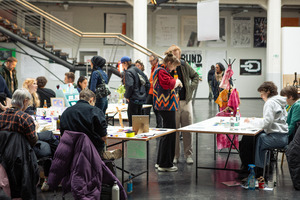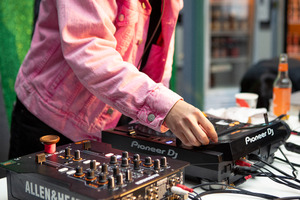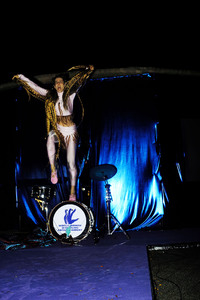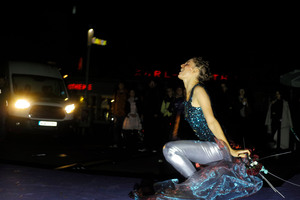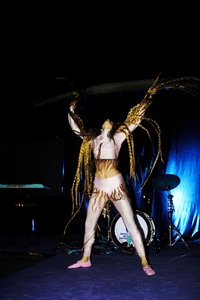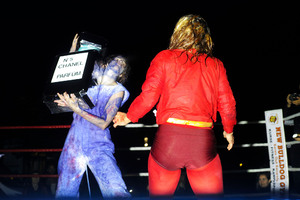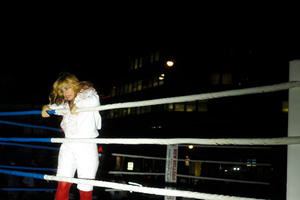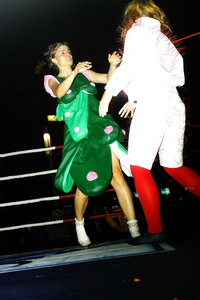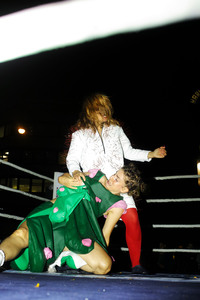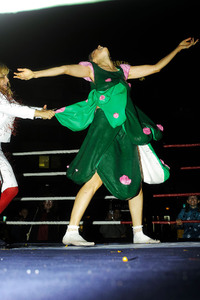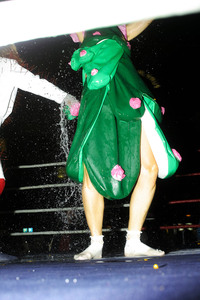"Fotografien der Aufführung"
| Begriff | Fotografien der Aufführung |
| Metakey | Beziehung/Funktion (media_object:relationship) |
| Typ | Keyword |
| Vokabular | Medienobjekt |
215 Inhalte
- Seite 1 von 18
Tag der offenen Tür im Hallenbau 2024
- Titel
- Tag der offenen Tür im Hallenbau 2024
- Beschreibung (de)
- Gemeinsam mit unseren Hallenbau-Partnern öffnen wir unsere Pforten am 04. Februar 2024.
Besuchen Sie uns uns am neuen »Tag der offenen Tür« im Hallenbau und schauen Sie hinter die Kulissen von allen vier Institutionen. Das ZKM | Karlsruhe, die Staatliche Kunsthalle Karlsruhe, die Hochschule für Gestaltung Karlsruhe und die Städtische Galerie Karlsruhe freuen sich auf Sie.
Der neue »Tag der offenen Tür im Hallenbau« wird jedes Jahr am ersten Sonntag im Februar stattfinden. Er ersetzt den traditionellen Termin am 6. Januar.
Zum Tag der offenen Tür im Hallenbau präsentiert die HfG speziell das Thema Druck und Publikation, und zwar in kleinen Auflagen, vielfältig und zum Mitmachen. Sie lädt dazu ein, Publishing Groups und andere Studierenden-Initiativen kennenzulernen. Zudem wird es eine kleine Ausstellung und Führungen durch die Hochschule für Studieninteressierte geben.
Unser Programm ab 11 Uhr:
11:30-12 Uhr Lesung KLAK Lesebühne
12-14 Uhr Sozial & Durstig Pop Up Bar mit DJ Dakang
14 Uhr 1. Führung zum Pavillon Sonic Spatiology Vol. 2
15 Uhr Vortrag Paolo Caffoni Lesebühne
16 Uhr 2. Führung zum Pavillon Sonic Spatiology Vol. 2
Parallel Kino im Blauen Salon
11:00 Uhr bis 13:30 Uhr - Sparte I
13.30 Uhr bis 14:00 Uhr - Mittagspause
14:00 Uhr bis 16:30 Uhr - Sparte II
17:00 Uhr bis 19:00 Uhr - Abschluss - ROGER & ME (1989)
Das Kultivierte Jahrmarktkino - Kurzfilme aus 31 1/2 Jahren HfG-Geschichte
Von 11 bis 17 Uhr lassen wir im Kino im Blauen Salon die Pforten kontinuierlich geöffnet und projizieren ein großes Querbeet-Programm an hauseigenen Kurzfilmen. Dabei mischen wir Arbeiten von aktuell noch eingeschriebenen Regisseur*innen mit den Werken sagenumwobener ehemaliger Studierender. Alles ist dabei: Von der symbolischen HfG-Grundsteinlegung über 90er-Jahre Trash-Ästhetik, Essay- und Animationsfilmen bis hin zu dramatischen Miniaturen. Nehmen Sie ihre imaginäre Zuckerwatte mit in unser Jahrmarktkino und lassen Sie sich berauschen von der Vielfalt einer dreidekadigen Schaffensperiode.
Zum Tagesabschluss möchte sich das Kino im Blauen Salon mit einer Zusatz-Attraktion als reguläre Spielstätte vorstellen : Michael Moore's Frühwerk "Roger & Me" von 1989. Moore öffnet im weitesten Sinne auch hier die Türen (so viel zu Legitimierung!) in seinem Heimatort Flint, Michigan, um die verantwortlichen Chefs und Vorgesetzten zu befragen, wie es zu der Massentlassung von 35.000 Personen in der lokalen General-Motors Fabrik kommen konnte. Eine unterhaltsame Mischung aus Galgenhumor und David vs. Goliath-Kämpfen. Wir projizieren den Film als 35mm Kopie im englischen Original.
- Gemeinsam mit unseren Hallenbau-Partnern öffnen wir unsere Pforten am 04. Februar 2024.
- Typ des Projekts/Werks
- Schlagworte
- Ort: Institution
- Stadt
- Land
- Internetlinks
- Titel
- Tag der offenen Tür im Hallenbau 2024
- Urheberrechtshinweis
- © Staatliche Hochschule für Gestaltung Karlsruhe, photo : Jihye Jang
- Medienersteller/in
- Beziehung/Funktion
- Medien-Beschreibung
- Momente der »Tag der offenen Tür im Hallenbau«, 2024
- Medien-Beschreibung (en)
- Moments of der »Tag der offenen Tür im Hallenbau«, 2024
- Importiert am
- 11.02.2024
- Übergeordnete Sets
- 1
Tag der offenen Tür im Hallenbau 2024
- Titel
- Tag der offenen Tür im Hallenbau 2024
- Beschreibung (de)
- Gemeinsam mit unseren Hallenbau-Partnern öffnen wir unsere Pforten am 04. Februar 2024.
Besuchen Sie uns uns am neuen »Tag der offenen Tür« im Hallenbau und schauen Sie hinter die Kulissen von allen vier Institutionen. Das ZKM | Karlsruhe, die Staatliche Kunsthalle Karlsruhe, die Hochschule für Gestaltung Karlsruhe und die Städtische Galerie Karlsruhe freuen sich auf Sie.
Der neue »Tag der offenen Tür im Hallenbau« wird jedes Jahr am ersten Sonntag im Februar stattfinden. Er ersetzt den traditionellen Termin am 6. Januar.
Zum Tag der offenen Tür im Hallenbau präsentiert die HfG speziell das Thema Druck und Publikation, und zwar in kleinen Auflagen, vielfältig und zum Mitmachen. Sie lädt dazu ein, Publishing Groups und andere Studierenden-Initiativen kennenzulernen. Zudem wird es eine kleine Ausstellung und Führungen durch die Hochschule für Studieninteressierte geben.
Unser Programm ab 11 Uhr:
11:30-12 Uhr Lesung KLAK Lesebühne
12-14 Uhr Sozial & Durstig Pop Up Bar mit DJ Dakang
14 Uhr 1. Führung zum Pavillon Sonic Spatiology Vol. 2
15 Uhr Vortrag Paolo Caffoni Lesebühne
16 Uhr 2. Führung zum Pavillon Sonic Spatiology Vol. 2
Parallel Kino im Blauen Salon
11:00 Uhr bis 13:30 Uhr - Sparte I
13.30 Uhr bis 14:00 Uhr - Mittagspause
14:00 Uhr bis 16:30 Uhr - Sparte II
17:00 Uhr bis 19:00 Uhr - Abschluss - ROGER & ME (1989)
Das Kultivierte Jahrmarktkino - Kurzfilme aus 31 1/2 Jahren HfG-Geschichte
Von 11 bis 17 Uhr lassen wir im Kino im Blauen Salon die Pforten kontinuierlich geöffnet und projizieren ein großes Querbeet-Programm an hauseigenen Kurzfilmen. Dabei mischen wir Arbeiten von aktuell noch eingeschriebenen Regisseur*innen mit den Werken sagenumwobener ehemaliger Studierender. Alles ist dabei: Von der symbolischen HfG-Grundsteinlegung über 90er-Jahre Trash-Ästhetik, Essay- und Animationsfilmen bis hin zu dramatischen Miniaturen. Nehmen Sie ihre imaginäre Zuckerwatte mit in unser Jahrmarktkino und lassen Sie sich berauschen von der Vielfalt einer dreidekadigen Schaffensperiode.
Zum Tagesabschluss möchte sich das Kino im Blauen Salon mit einer Zusatz-Attraktion als reguläre Spielstätte vorstellen : Michael Moore's Frühwerk "Roger & Me" von 1989. Moore öffnet im weitesten Sinne auch hier die Türen (so viel zu Legitimierung!) in seinem Heimatort Flint, Michigan, um die verantwortlichen Chefs und Vorgesetzten zu befragen, wie es zu der Massentlassung von 35.000 Personen in der lokalen General-Motors Fabrik kommen konnte. Eine unterhaltsame Mischung aus Galgenhumor und David vs. Goliath-Kämpfen. Wir projizieren den Film als 35mm Kopie im englischen Original.
- Gemeinsam mit unseren Hallenbau-Partnern öffnen wir unsere Pforten am 04. Februar 2024.
- Typ des Projekts/Werks
- Schlagworte
- Ort: Institution
- Stadt
- Land
- Internetlinks
- Titel
- Tag der offenen Tür im Hallenbau 2024
- Urheberrechtshinweis
- © Staatliche Hochschule für Gestaltung Karlsruhe, photo : Jihye Jang
- Medienersteller/in
- Beziehung/Funktion
- Medien-Beschreibung
- Momente der »Tag der offenen Tür im Hallenbau«, 2024
- Medien-Beschreibung (en)
- Moments of der »Tag der offenen Tür im Hallenbau«, 2024
- Importiert am
- 11.02.2024
- Übergeordnete Sets
- 1
WWWE Fotografien
- Titel
- WWWE Fotografien
- Autor/in
- Kategorie
- Schlagworte
- Titel
- WWWE Fotografien
- Titel (en)
- WWWE Photographs
- Urheberrechtshinweis
- © Hanna Scherwinski
- Rechtsschutz/Lizenz
- Freigabe Nutzung HfG
- Medienersteller/in
- Beziehung/Funktion
- Projektleiter/in
- Semester
- Studiengang
- Typ der Abschlussarbeit
- Importiert am
- 13.06.2024
- Übergeordnete Sets
- 1
WWWE Fotografien
- Titel
- WWWE Fotografien
- Autor/in
- Kategorie
- Schlagworte
- Titel
- WWWE Fotografien
- Titel (en)
- WWWE Photographs
- Urheberrechtshinweis
- © Hanna Scherwinski
- Rechtsschutz/Lizenz
- Freigabe Nutzung HfG
- Medienersteller/in
- Beziehung/Funktion
- Projektleiter/in
- Semester
- Studiengang
- Typ der Abschlussarbeit
- Importiert am
- 13.06.2024
- Übergeordnete Sets
- 1
WWWE Fotografien
- Titel
- WWWE Fotografien
- Autor/in
- Kategorie
- Schlagworte
- Titel
- WWWE Fotografien
- Titel (en)
- WWWE Photographs
- Urheberrechtshinweis
- © Hanna Scherwinski
- Rechtsschutz/Lizenz
- Freigabe Nutzung HfG
- Medienersteller/in
- Beziehung/Funktion
- Projektleiter/in
- Semester
- Studiengang
- Typ der Abschlussarbeit
- Importiert am
- 13.06.2024
- Übergeordnete Sets
- 1
WWWE Fotografien
- Titel
- WWWE Fotografien
- Autor/in
- Kategorie
- Schlagworte
- Titel
- WWWE Fotografien
- Titel (en)
- WWWE Photographs
- Urheberrechtshinweis
- © Hanna Scherwinski
- Rechtsschutz/Lizenz
- Freigabe Nutzung HfG
- Medienersteller/in
- Beziehung/Funktion
- Projektleiter/in
- Semester
- Studiengang
- Typ der Abschlussarbeit
- Importiert am
- 13.06.2024
- Übergeordnete Sets
- 1
WWWE Fotografien
- Titel
- WWWE Fotografien
- Autor/in
- Kategorie
- Schlagworte
- Titel
- WWWE Fotografien
- Titel (en)
- WWWE Photographs
- Urheberrechtshinweis
- © Hanna Scherwinski
- Rechtsschutz/Lizenz
- Freigabe Nutzung HfG
- Medienersteller/in
- Beziehung/Funktion
- Projektleiter/in
- Semester
- Studiengang
- Typ der Abschlussarbeit
- Importiert am
- 13.06.2024
- Übergeordnete Sets
- 1
WWWE Fotografien
- Titel
- WWWE Fotografien
- Autor/in
- Kategorie
- Schlagworte
- Titel
- WWWE Fotografien
- Titel (en)
- WWWE Photographs
- Urheberrechtshinweis
- © Hanna Scherwinski
- Rechtsschutz/Lizenz
- Freigabe Nutzung HfG
- Medienersteller/in
- Beziehung/Funktion
- Projektleiter/in
- Semester
- Studiengang
- Typ der Abschlussarbeit
- Importiert am
- 13.06.2024
- Übergeordnete Sets
- 1
WWWE Fotografien
- Titel
- WWWE Fotografien
- Autor/in
- Kategorie
- Schlagworte
- Titel
- WWWE Fotografien
- Titel (en)
- WWWE Photographs
- Urheberrechtshinweis
- © Hanna Scherwinski
- Rechtsschutz/Lizenz
- Freigabe Nutzung HfG
- Medienersteller/in
- Beziehung/Funktion
- Projektleiter/in
- Semester
- Studiengang
- Typ der Abschlussarbeit
- Importiert am
- 13.06.2024
- Übergeordnete Sets
- 1
WWWE Fotografien
- Titel
- WWWE Fotografien
- Autor/in
- Kategorie
- Schlagworte
- Titel
- WWWE Fotografien
- Titel (en)
- WWWE Photographs
- Urheberrechtshinweis
- © Hanna Scherwinski
- Rechtsschutz/Lizenz
- Freigabe Nutzung HfG
- Medienersteller/in
- Beziehung/Funktion
- Projektleiter/in
- Semester
- Studiengang
- Typ der Abschlussarbeit
- Importiert am
- 13.06.2024
- Übergeordnete Sets
- 1
WWWE Fotografien
- Titel
- WWWE Fotografien
- Autor/in
- Kategorie
- Schlagworte
- Titel
- WWWE Fotografien
- Titel (en)
- WWWE Photographs
- Urheberrechtshinweis
- © Hanna Scherwinski
- Rechtsschutz/Lizenz
- Freigabe Nutzung HfG
- Medienersteller/in
- Beziehung/Funktion
- Projektleiter/in
- Semester
- Studiengang
- Typ der Abschlussarbeit
- Importiert am
- 13.06.2024
- Übergeordnete Sets
- 1
WWWE Fotografien
- Titel
- WWWE Fotografien
- Autor/in
- Kategorie
- Schlagworte
- Titel
- WWWE Fotografien
- Titel (en)
- WWWE Photographs
- Urheberrechtshinweis
- © Hanna Scherwinski
- Rechtsschutz/Lizenz
- Freigabe Nutzung HfG
- Medienersteller/in
- Beziehung/Funktion
- Projektleiter/in
- Semester
- Studiengang
- Typ der Abschlussarbeit
- Importiert am
- 13.06.2024
- Übergeordnete Sets
- 1
